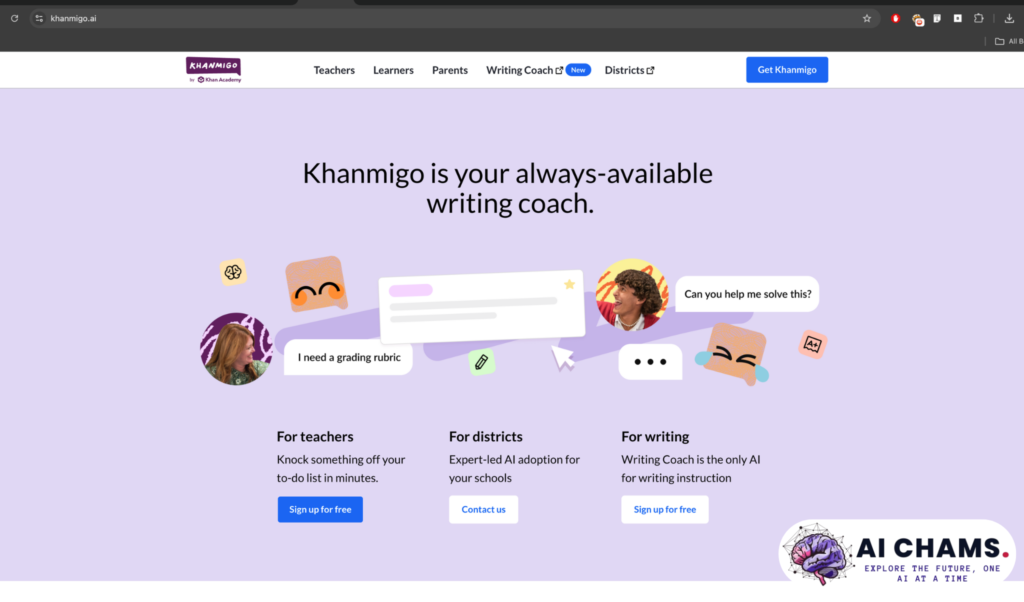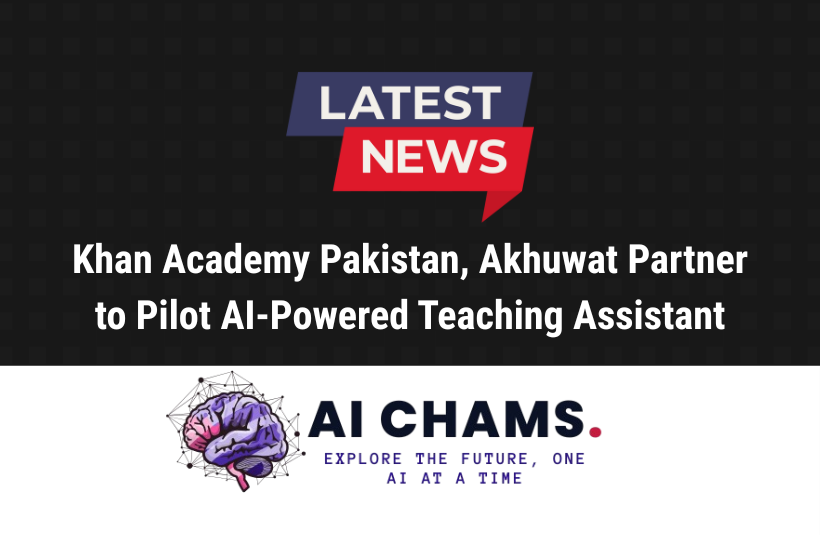Introduction
In a groundbreaking step toward transforming education in Pakistan, Khan Academy Pakistan (KAP) has joined forces with Akhuwat, one of the country’s leading nonprofit education networks, to pilot Khanmigo, an AI-powered teaching assistant. Announced on April 17, 2025, this collaboration aims to leverage artificial intelligence to personalize learning, support teachers, and bridge educational gaps in underserved communities. With Pakistan facing challenges like high dropout rates and limited access to quality teaching resources, this initiative could be a game-changer.
This article explores the details of the KAP-Akhuwat partnership, the features of the Khanmigo AI tool, the goals of the pilot program, and its potential to reshape Pakistan’s education landscape. From empowering educators to engaging students, this pilot is a bold step toward making world-class education accessible to all. Let’s dive into how AI is set to revolutionize classrooms in Pakistan!
Background of the Partnership
Khan Academy Pakistan, launched in December 2024, is an extension of Khan Academy, a global nonprofit founded by Sal Khan in 2006 to provide free, high-quality online education. KAP focuses on delivering localized content aligned with Pakistan’s national curriculum, available in Urdu and regional languages like Sindhi and Pashto. Its mission is to make learning equitable, especially for the 24 million children in Pakistan who have never attended school.
Akhuwat, founded by Dr. Amjad Saqib, is a renowned nonprofit known for its work in education, microfinance, and community development. With a network of schools serving low-income communities, Akhuwat is committed to innovative solutions that uplift marginalized populations. Its educational programs emphasize accessibility and quality, making it an ideal partner for KAP.
The partnership, formalized through a Memorandum of Understanding (MoU) signed by Dr. Saqib and KAP CEO Zeeshan Hasan, was formed to harness AI to enhance teaching and learning. By piloting Khanmigo in Akhuwat’s schools, the collaboration aims to test how AI can support educators and students in resource-constrained settings, with an eye toward scalability across Pakistan.
My Take: When I read about this partnership, I was struck by how two mission-driven organizations are teaming up to tackle Pakistan’s education crisis with cutting-edge tech. It’s inspiring to see innovation meet compassion!
What Is the AI-Powered Teaching Assistant?
Khanmigo is Khan Academy’s AI-powered tool, initially launched in 2023 and built using advanced language models like GPT-4 and later enhanced with Microsoft’s Azure OpenAI Service. Designed to act as both a personal tutor for students and a teaching assistant for educators, Khanmigo brings personalized learning and classroom efficiency to the forefront.

Core Features
- For Students:
- Acts as a virtual tutor, offering step-by-step guidance on subjects like math, science, and humanities.
- Uses a Socratic approach, asking questions to deepen understanding rather than providing direct answers, reducing the risk of cheating.
- Supports multilingual learning, including Urdu and regional Pakistani languages, ensuring accessibility.
- For Teachers:
- Automates lesson planning aligned with national standards, saving time on prep work (studies show teachers spend over 50% of their time on such tasks).
- Generates learning objectives, rubrics, exit tickets, and progress summaries to track student performance.
- Offers creative lesson ideas, like using everyday items to teach complex concepts (e.g., marshmallows for chemistry experiments).
- Accessibility: Works on smartphones, tablets, and laptops with lightweight content options to accommodate Pakistan’s inconsistent internet connectivity.
How It Works
In the classroom, teachers use Khanmigo via a web or mobile interface to plan lessons or assess student progress. Students interact with Khanmigo for personalized tutoring, asking questions or working through exercises at their own pace. The tool’s multilingual design and mobile-friendly interface make it suitable for both urban and rural settings, from Karachi to Gilgit-Baltistan.
My Take: Khanmigo feels like a super-smart teaching assistant who never sleeps. I love that it’s built to guide students thoughtfully instead of just handing out answers!
Goals and Objectives of the Pilot Program
The KAP-Akhuwat pilot program, launched in early 2025, has ambitious goals to transform education in Akhuwat’s schools:
- Personalized Learning: Khanmigo tailors lessons to each student’s pace and level, addressing learning gaps in subjects like math and science. This is critical in Pakistan, where ** sociocultural factors and varying learning capacities** create diverse classroom needs.
- Bridging Educational Gaps: By targeting low-income communities served by Akhuwat, the program aims to provide world-class resources to students who lack access to quality teachers or materials.
- Empowering Teachers: The pilot includes training for educators to use Khanmigo effectively, enabling them to focus on student engagement rather than administrative tasks. Zeeshan Hasan, KAP CEO, emphasized, “Khanmigo is designed to assist educators in personalized teaching.”
- Data-Driven Instruction: Khanmigo’s progress summaries and feedback tools help teachers identify areas where students need support, making instruction more targeted and effective.
Example: A teacher in an Akhuwat school could use Khanmigo to generate a math lesson plan aligned with Pakistan’s curriculum, while students use the tool to practice fractions at their own pace, with real-time feedback.
My Take: The focus on personalization is a big deal—every student learns differently, and Khanmigo seems like a tool that gets that.
Potential Impact on Pakistan’s Education System
Pakistan’s education system faces significant challenges: over 24 million children are out of school, and teacher shortages and outdated resources hinder progress. The KAP-Akhuwat pilot could pave the way for systemic change:
- Democratizing Access: By offering Khanmigo on low-cost devices and in regional languages, the program ensures equitable education for rural and underserved students. This aligns with KAP’s mission to reach the widest student base possible.
- Teacher Support: Automating prep work frees teachers to focus on mentoring and inspiring students, addressing Pakistan’s teacher shortage crisis. Dr. Amjad Saqib noted, “This partnership reflects our shared commitment to education innovation.”
- Improved Outcomes: Personalized tutoring could boost student engagement and performance, reducing dropout rates. Early pilots in the U.S. showed Khanmigo helped students gain deeper understanding, with some asking more questions than they would a teacher.
- Scalability: If successful, the pilot could expand to other school networks like TCF, CARE Foundation, and Durbeen, which are already KAP partners for future student-focused pilots in 2025.
Example: In rural Punjab, a student with limited access to qualified math teachers could use Khanmigo on a shared smartphone to master algebra, while their teacher uses the tool to track progress and tailor lessons.
My Take: This feels like a lifeline for kids in remote areas who deserve the same shot at learning as anyone else. Scaling this could be huge!
Challenges and Considerations
While the pilot holds immense promise, it faces hurdles that must be addressed:
- Infrastructure Issues: Pakistan’s inconsistent internet and limited device access, especially in rural areas, could hinder Khanmigo’s reach. KAP’s lightweight content and mobile-friendly design help, but broader infrastructure improvements are needed.
- Language and Accessibility: While Khanmigo supports Urdu and regional languages, ensuring all content is culturally relevant and fully translated is critical for inclusivity.
- Ethical AI Use: Concerns about data privacy, overreliance on AI, and the digital divide must be managed. Khan Academy emphasizes responsible AI use, requiring parental consent or school oversight for students under 18.
- Teacher Adoption: Some educators may resist AI tools due to unfamiliarity or fear of being replaced. Comprehensive training and clear communication that Khanmigo supports, not supplants, teachers are essential.
My Take: Internet access is a real issue, but KAP’s focus on mobile-friendly, low-bandwidth tools shows they’re thinking about the realities on the ground.
Conclusion
The partnership between Khan Academy Pakistan and Akhuwat to pilot Khanmigo marks a bold step toward reimagining education in Pakistan. By bringing AI-powered personalized learning and teacher support to Akhuwat’s schools, this initiative tackles some of the country’s most pressing educational challenges—access, quality, and equity. With features like multilingual tutoring, automated lesson planning, and mobile accessibility, Khanmigo has the potential to empower students and educators alike, particularly in underserved communities.
As the pilot unfolds in 2025, its success could inspire a broader rollout, transforming classrooms across Pakistan and serving as a model for edtech innovation globally. For now, this collaboration is a beacon of hope, showing how technology and compassion can work hand in hand to unlock opportunities for millions. Stay tuned to KAP and Akhuwat’s journey, and consider supporting local efforts to bring world-class education to every corner of Pakistan. The future of learning is here—let’s embrace it!



